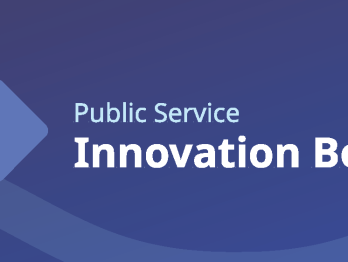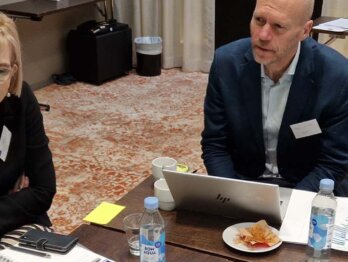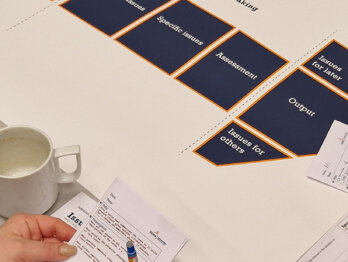Anticipatory Innovation: Get started with the right tools

Decision-makers and experts frequently express an unmet need for resources to help them better perceive, make sense of, and act upon future changes as they are emerging in the present. But, how do we get started with creating something new that responds to the future as it’s shaping up around us? That process of generating novel initiatives that take the future into account is what we mean by “anticipatory innovation”.
To make the journey easier, DDC and OPSI have launched the Anticipatory Innovation Resource (AIR), a collection of approaches (tools and methods), cases and answers to some of the most important questions when starting to innovate for the future.
Within AIR, you will find the Anticipatory Innovation Starter Kit (AISK), an approach to anticipation developed by OPSI and the Experimentation Lab for Public Administration (LabX), part of the Administrative Modernisation Agency (AMA) in Portugal. The toolkit offers a step-by-step approach to access a set of methodologies and tools to solve organisational challenges in the area of anticipatory innovation governance – the structures and mechanisms in place that allow or promote anticipatory innovation to occur.

The future is in the AIR
Katrine Rosalia Weilguny Rune, a former member of the DDC team, takes us through the thinking behind AIR.
There is a misconception that the future is an objective truth, a fate waiting to happen. That is not the case, rather it’s emerging and something we can co-create
Joshua Polchar
The opening quote, one of the first things Josh told me in our interview, was an eye-opener. Josh elaborated, “the future is pure fiction, we cannot know if it is the objective truth before it has happened and therefore become our present”. So why should we bother to start working with a subject that we can never guarantee will give us the objective truth? Because we have to.
The Anticipatory Innovation Resource (AIR) is a first-of-its-kind resource that helps policy practitioners and experts in public sector innovation get a holistic perspective of anticipatory innovation. By linking frequently asked questions together with cases and approaches, it helps identify opportunities to use anticipation, develop effective interventions, apply findings to policy and communicate results for impact.
Furthermore, it aims to address the impact gap, the gap between the knowledge that is created and the actions we see based on this knowledge. Strategic foresight is only fiction unless we use the information and knowledge it gives us to create and implement change. We need to collaborate with the users and to hand over our knowledge from our studies of the future, in a way for policymakers to interact with it. The idea is to develop a better foundation to make decisions and policies, and this is where AIR comes in.
Organisations like OPSI and DDC have explored, learned and built upon years of successes and failures. AIR is a collection of all we have learnt in the space of anticipatory innovation. You can jump in and out to find answers to questions, as well as cases and approaches from multiple organisations, including Portugal’s Anticipatory Innovation Starter Kit, and gain insights and build on their experiences. Devoid of jargon, in as much as possible, it is giving public sector innovators a starting point to anticipatory innovation.
AISK the future!
Jorge Lagarto and Rui Miguel Martinho, members of the LabX team, elaborate on how they developed AISK.
We live in uncertain times. New technologies and new societal challenges mean that public sector contexts are more complex, and policymaking needs to cope with the changes we are witnessing. Public Administration must be proactive, not only providing effective responses to day-to-day problems, but also assuming a prospective stance towards challenges that most of the time cannot be predicted.
With this context and inspired by OPSI’s work around anticipatory innovation, LabX developed the Anticipatory Innovation Starter Kit (AISK). The resource supports managers and public servants to anticipate future challenges and improve the design of public policies and services.
AISKs goal is to put anticipatory innovation into practice. By drawing in feedback from experts, and the results from workshops with end users and early adopters under the OPSI-LabX incubator programme, we tailored the architecture of AISK, ensuring the creation of an actionable, user-centric and problem-oriented kit.
At the moment we are getting ready to start the dissemination of the kit to public administration units in Portugal. First, we are developing a capacity-building plan, considering all the skills needed to apply the tools presented in the kit. Then, making demonstrative use cases with services that we are redesigning in the scope of the Portuguese Recovery and Resilience Plan. We want to show the value of looking for the future and be able to prepare ourselves for possible scenarios, or to prevent undesirable consequences of the implementation of a new service.
In the end, the objective will be to create conditions in public entities so that, according to their own challenges, they can be more prepared to lead with the uncertainty of the future.
These projects were made possible with the support from the European Union.












